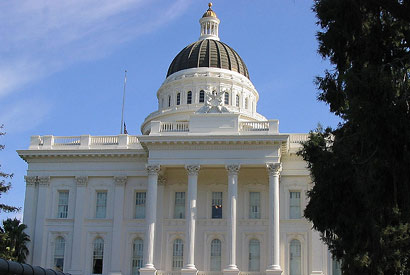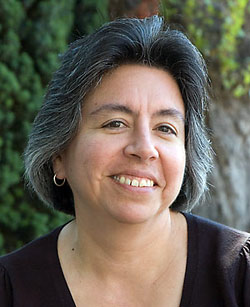For Berkeley alums, this UC Day is all about the future
For a dozen or so Berkeley alumni, staff and students, a visit to the Capitol is a chance to speak directly to legislators - in their own voices - about the university's contributions to California in the form of education, innovation and jobs.

March 1, 2011
It happens every year, but UC Day 2011 in Sacramento carries a special urgency. Today, under the auspices of the campus’s Government and Community Relations office, a determined group of Berkeley alums, staff and students head to the state capital knowing the stakes have seldom been higher.
The systemwide event, sponsored by the UC Alumni Association and the Office of the President in conjunction with campus alumni associations and government-relations units, has always been about making the case in the Capitol for UC’s contributions to the state and its people — contributions that take the form not only of top-flight education, but of research innovation and jobs.
California’s $25.4 billion budget shortfall, however, is putting those contributions in jeopardy as never before. With $500 million in funding cuts hanging over the UC system — and the grisly prospect of far deeper cuts should a proposal for tax extensions fail to win voter approval — the Berkeley campus is already looking for ways to slash yet another $80 million from its shrinking, $1.8 billion budget.

Juliann Martinez
That’s why the Cal Alumni Association board voted to support the placement of a measure on the California ballot that would extend current taxes for five years — and, in large measure, why a dozen or so Berkeley advocates are volunteering their time today.
For one member of the Berkeley contingent, Zach Gentry, this is his first UC Day. After graduating from Berkeley in 2001, Gentry earned an MBA from the Haas School of Business in 2005, and went on to found a green-energy company, Adura Technologies, that currently has 30 employees — a number he expects to rise, recession notwithstanding, to 40 or 45 by the end of the year.
“I’m part of the executive team of a company that came out of the university,” he says. “Its technology developed at UC Berkeley. And my concern is that opportunities like that will be less common if the economic-growth mission is curtailed. So part of my mission is to stress the importance of the university as a job-creation engine.”
He also plans to remind legislators of the importance of a “modest” $65 million program that’s now on the chopping block — but which he says is yielding significant results, both for energy efficiency and for residents’ energy bills. “It’s very likely that Adura would never have existed were it not for the $75,000 that was awarded to us in 2004” under the California Energy Commission program, he says, adding that the company has since raised $22 million in venture-capital funds.
Juliann Martinez, an ’87 Berkeley alum who’s worked on campus for 22 years — currently as director of gift management — says her No. 1 goal is to “bring the staff voice” to the Capitol. A member of the Berkeley Staff Assembly and staff adviser to the UC regents, Martinez believes that while legislators tend to understand the meaning of cuts for students and faculty, their grasp of the staff perspective can be tenuous.
“I want to remind them that we are the second-largest employer in the state of California,” she says. “And with funding cuts from the state, staff are seriously concerned about their ability to provide the level of services and support they do now to students, to faculty, to visitors and to patients. I’d like to be able to get that message across to legislators.”
Martinez also notes that UC employees generally stay at the university for 10 to 15 years, becoming solid, long-term members of their communities. “When there are these huge cuts, you get this ripple effect,” she explains. “Positions being lost at the university result in stability being lost in the community.”
Under Gov. Jerry Brown’s budget proposal, released soon after he took office in January, the state would cut funding to UC by $500 million, a 16.4 percent reduction from 2010-11. The already-strapped Berkeley campus — with a total operating budget of $1.8 billion — would take a hit of some $80 million.
And that’s the best-case scenario. It hinges on the success of the governor’s plan to win voter approval of a ballot measure to extend $12.5 billion in continuing tax revenues over the next five years. But even a getting the measure on the June ballot will require a two-thirds vote of the Legislature — which, when it comes to taxes, represents a significant challenge.
And if the plan fails? The Legislative Analyst’s Office warns that Sacramento, faced with the need to address a $25.4 billion shortfall without projected revenues from the tax proposal, could more than double the size of the cuts to the UC system.
Berkeley Assemblywoman Nancy Skinner calls the governor’s budget proposal “an honest reflection of the ongoing hit the global recession has had on California’s economy,” and warns that failure to provide tax extensions in June will leave the state $12.5 billion deeper in the red.
“As one of the few areas where our state government has flexibility,” she says, “the University of California — along with all education — will surely take a great hit as the Legislature identifies another $12.5 billion to cut.”
All of those traveling to Sacramento today hope to help limit the damage to UC, the Berkeley campus, and the state of California. They are out to demonstrate, in one way or another, that Berkeley is part of the solution to the state’s economic woes — that its alumni found businesses that employ Californians, that they work in sectors and fields that grow the state’s economy, and that they work for the public good in fields like education and public safety.
For those who can’t make the trip, the California Alumni Association is harnessing its formidable e-advocacy system to the task of asking members statewide to urge their legislators to back the June ballot initiative.